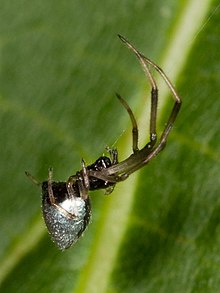Argyrodes
| Dewdrop spiders | |
|---|---|

| |
| Scientific classification | |
| Kingdom: | |
| Phylum: | |
| Class: | |
| Order: | |
| Suborder: | |
| Family: | |
| Genus: | Argyrodes Simon, 1864
|
| Species | |
|
A. argentatus | |
| Diversity | |
| 95 species | |
Spiders of the genus Argyrodes (Theridiidae), also called dewdrop spiders, occur worldwide. They are best known as kleptoparasites: they steal other spiders' prey. They invade and reside in their host's web even though they can spin their own webs.[1] However, the relationship can sometimes be commensal or even mutual since the dewdrop spider can feed on small trapped insects that are not eaten by the host.[2] Some species can even prey upon the host.[1] Many species are black with silvery markings. Most species are relatively small. For example, A. incursus has a body length of 3–4.5 mm[3] while A. fissifrons has a body length of about 12 mm.[2]
Distribution
Most Argyrodes are found in the tropics although 15 species are found in the United States.[1] Dewdrop spiders prefer large webs and clustered webs compared to small and isolated ones. Large webs tend to have more kleptoparasites than smaller ones. Isolated webs tend to have lesser number of kleptoparasites compared to clustered webs of the same size.[4]
Name
The genus name is derived from Greek argyros "silver" and -odes "like".
Footnotes
References
- Information, picture, Australian distribution of A. incursus
- Guarisco, Hank (October 1999). "Distributional Status and Natural History Observations of the Genus Argyrodes (Araenae: Theridiidae) in Kansas". Transactions of the Kansas Academy of Science. 102 (3–4): 138–141. doi:10.2307/3627875. JSTOR 3627875.
{{cite journal}}:|access-date=requires|url=(help) - Tso, I-Min; Lucia Liu Severinghaus (2000). "Argyrodes fissifrons Inhabiting Webs of Cyrtophora Hosts: Prey Size Distribution and Population Characteristics" (PDF). Zoological Studies. 39 (3): 236–242. Retrieved 2007-05-21.
- Agnarsson, Ingi (2003). "Spider webs as habitat patches-the distribution of kleptoparasites (Argyrodes, Theridiidae), among host webs (Nephilia, Tetragnathidae)" (PDF). The Journal of Arachnology. 31 (3): 344–349. doi:10.1636/s02-21. Archived from the original (PDF) on 2007-04-21. Retrieved 2007-05-21.
Further reading
- Koh, T.H.; Li, D. (2002). "Population characteristics of a kleptoparasitic spider Argyrodes flavescens (Araenae: Theridiidae) and its impact on a host spider Nephila pilipes (Araneae: Tetragnathidae) from Singapore" (PDF). The Raffles Bulletin of Zoology. 50 (1): 153–160.
